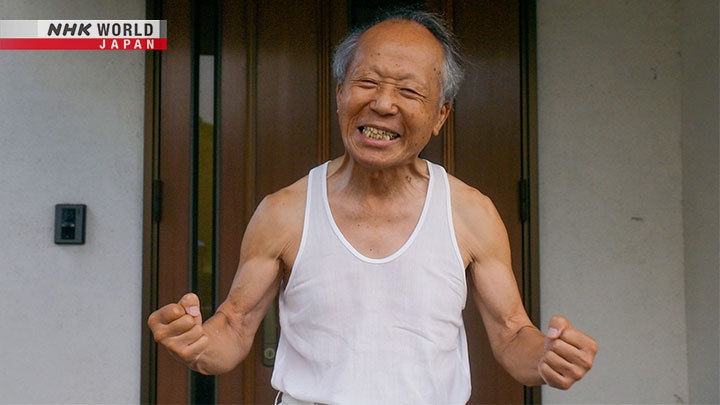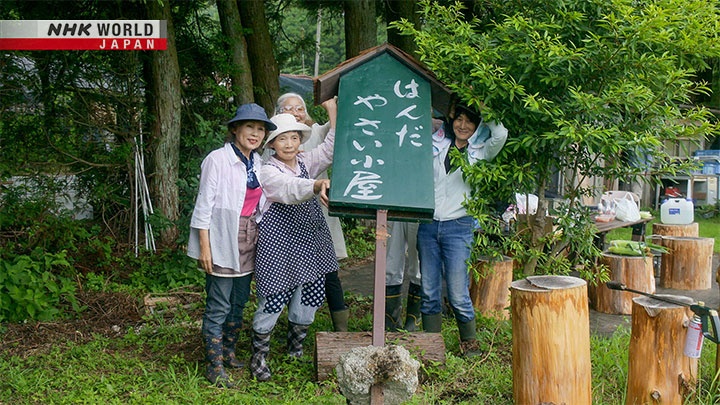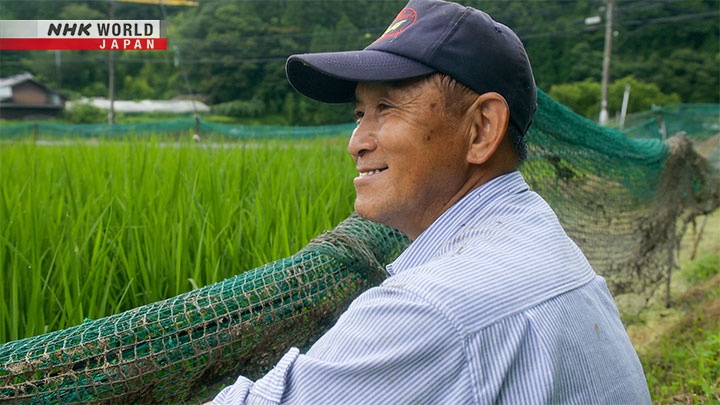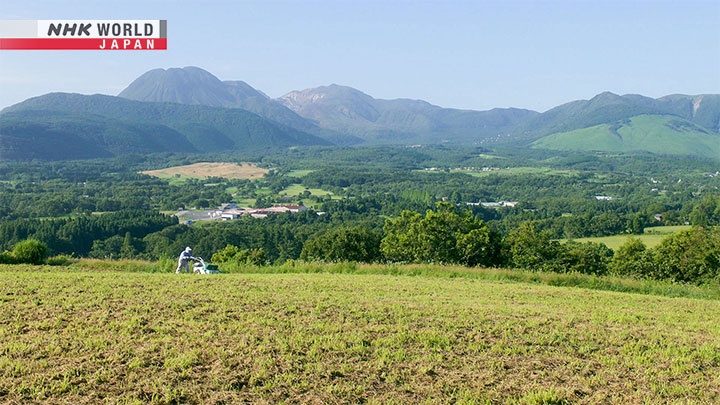A Country Doctor in 2024
We revisit the highland village where their doctor not only provides care for its aging residents but is also reinvigorating the community, helping revitalize the area with his energy and fresh ideas.




Transcript
Everyone adored the Alpine milkman.
For his yodel loud and clear.
Yodel-ay-ee-oo.
Oh, I've forgotten the next bit.
These mountains, the greenery.
Amazing, isn't it?
Only 1,600 people still live in this mountain village, a number that keeps falling.
The busiest place in the village is its sole medical clinic.
- You were in there for over an hour.
- The doctor never stops talking.
He's a great doctor.
But he really does like to talk.
We should both live to be 100.
Then a quick and painless passing.
Doctor Nose Yoshiaki, now 79, became the village's doctor 15 years ago.
Starting in 2019, we've been following Doctor Nose and his patients as they gradually age.
Your twilight years shouldn't be a time
of fading away until you die a lonely death.
Be happy, live your life to the full,
then just die when your time comes.
My real mission is to help my patients live
and then face death in that state of mind.
The doctor never stops trying to bring people closer together.
He makes a special effort to help integrate newcomers into the community.
The story of a rural doctor and his aging patients, making the most of their twilight years.
The Handa Highlands in Oita, in the southwest of Japan.
The rainy season is over and the sky is clear.
Time to start the day.
Doctor Nose is the only physician living here in the village.
He had been a professor at a major national research university, a pioneer in medical informatics -
the collection and analysis of clinical data to improve health care.
Nice to see you earlier.
After 15 years as their doctor, he's become the person most villagers find easiest to talk with and confide in.
A keen photographer, Doctor Nose fell in love with the beauty of the Handa Highlands,
and began recording the way they changed with the passing seasons.
As time passed, the doctor found another subject for his camera.
Hello.
- He came in complaining of stomach pain.
- My gut hurts and I can't move my bowels.
I'm treating his constipation.
But there's nothing else wrong with him.
You can tell it's the home of a person living alone.
For years now, he's been photographing the villagers' daily lives.
His subjects are always thrilled to receive the personalized photo albums he makes.
Don't just look at the disease, look at the person.
Everyone has personal worries and problems,
but you never find out without getting close to them.
Taking their photos like this helps me
be a better doctor for the people of my village.
Another thing Doctor Nose does every day is to write down and reflect on his interactions with the villagers.
These are all the essays I've written.
I guess there are about 500 now.
Along with his photos, these essays form a record of life in the village.
A very talented and funny old man
I'd known for many years passed away.
I just heard about it this morning,
so I'm writing down my memories of him.
I used to often go to cut bamboo in his garden.
He's talking about Tomita Kazumoto, still in good health when we filmed them in 2021.
- Are you Doctor Nose's patient?
- Oh yes. He's keeping me alive.
What are you saying?
Look how fit he is. How old are you now?
I'm 86.
From Dr. Nose's essay "I Can Barely Breathe"
On his hospital bed, he whispered "I'm barely breathing."
He always made me laugh with his jokes, so I thought he was joking about this too.
Just whispering out of concern for the other patients in the room.
After not hearing from him for a while, I called his cell phone.
A voice said "This number is no longer in use."
A few days later, I was told that he had died.
In my 15 years here, I've seen off over 100 people.
So many memories.
One of the doctor's patients became a friend who has taught him much about traditional country life.
Tokimatsu Kazuhiro prefers to farm in the old way, the way of his ancestors.
They're bigger each time I come.
This is the best time of year, after the rainy season
when the young rice is pure green.
Cicadas chirping and evening showers.
I feel content and at peace with the world.
This evening, Tokimatsu has called the doctor to watch something interesting.
We're going to move a hornets' nest.
- What's that?
- Sulfur.
Making gunpowder.
Sulfur and charcoal.
- Are hornets a big problem here?
- Oh yes. I treat about 120 cases a year.
Over 15 years I've seen lots of hornet stings.
This traditional method uses smoke from a firework to stun the hornets.
Tokimatsu gets about 30 requests a year to remove hornet nests.
The hornets are coming.
Turn off your lights.
After the hornets return for the night, Tokimatsu inserts the lighted firework into their nest.
- Is the firework out?
- No, but I can't hear the hornets any more.
It's working then.
These days, most people use insecticides, and it's rare to see this traditional method.
You have to check it every day.
Any surviving larvae will emerge later.
You've got to take extra care to not get stung.
These are the larvae.
Hornet larvae are edible. It's a rare treat.
They're very tasty,
but you have to cook each type differently.
The problems caused by the village's falling population distressed Tokimatsu.
With no one living there, houses soon go to ruin.
So many houses now lie empty.
This one was abandoned three years earlier.
Tell me about the old lady who lived here.
She was very beautiful, as a young woman.
I'm amazed you're doing all this by yourself.
Mizuta Kasumi, who lived here, was a patient of Doctor Nose.
You had a fall and broke a bone, didn't you?
I'm glad you've recovered and are farming again.
It's reassuring to know there's a doctor nearby.
Concerned for the old lady, Doctor Nose would frequently drop by to see her.
After my husband died,
I told my children I could look after myself.
I have my vegetable plot and my rice paddy.
That keeps me busy.
Three years ago, Mizuta finally had to move into a care home in a neighboring town.
She was 93 when she died.
Unwilling to watch her home falling into ruin,
Tokimatsu decided to buy it and rent it to a newcomer keen to farm in the village.
This was Imamura Aya, who moved here over ten years earlier.
Imamura became fascinated by Tokimatsu's traditional way of farming, and he's teaching her all he knows.
It makes me so happy to have a rice paddy.
It's all I need. Some land to farm.
Passionate about preserving this knowledge, Tokimatsu spares no effort to pass it on.
There's one more patient Doctor Nose has been taking special care of.
Ishizaki Akemi has been working her 1.5-hectare farm alone for 25 years, ever since her husband died.
I don't want to live to be too old.
I'd like to just pass away suddenly one night.
She sells her vegetables at a roadside stand.
- Take a radish too.
- Thank you!
The work was getting too much for Ishizaki to do alone, so Doctor Nose arranged for a helper.
You should be filming Kihara san, not me.
Two years earlier, Kihara Shoko and her husband moved into the village.
She's also one of the doctor's patients.
- Kihara san will take over when I go.
- Don't say that. I'm just here to help.
I told you I'm all worn out.
They're always like this.
I can say just whatever I think to her.
- That goes for both of us.
- I'm so glad you became friends.
Every day, from early morning, Kihara comes to help Ishizaki in her field.
Kihara used to be a welfare worker back in the city.
Her dream was always to retire to the countryside and have a farm.
You need to talk to the plants.
Grow up big and tasty, little vegetables.
Working with people was a never-ending job.
With vegetables, it's different.
You always know what needs to be done.
I picked the corn! The job's all finished!
Look at her lovely house!
- So much better than mine.
- It's just new, that's all.
After the day's work is done, Ishizaki drops by Kihara's house for a cup of tea.
Today, chatting about their families, they discover something in common.
My sons left home after middle school.
In the city, kids don't leave until after university.
I don't get on so well with my sons.
They're quite happy for me to go off on my own.
Well, children have to have their own lives.
Mine told me we should both work hard
at our separate paths.
- A rainbow!
- Another one?
This one looks like it's touching your house.
This small hill in the heart of the valley has always meant a lot to Doctor Nose.
He loved its view of the village and mountains so much
that five years ago he bought most of the hill, and has been developing it ever since.
- I see you've been felling trees here.
- Yes.
- To clear the way in?
- That's right.
I need to bring the mower up this way.
The stairway starts here.
I'd never built stairs like these before.
I did all the work myself.
The path goes under these trees, and the leaves
are so pretty with the sun shining through.
I wanted to create a path
that would be a delight to stroll along.
This rest house he built is always open, for anyone to use.
Visitors drop in from all over the country.
- Is it OK to come in?
- Of course! Make yourself at home.
There's no charge.
- Is this your sister?
- My mother.
Your mother! Surely not!
What a beautiful place!
These mountains, and the lives of the people who live here.
Doctor Nose is creating a record of both.
From Dr. Nose's essay "Hinemosu Hill"
I can cure disease, but I can't make people healthy, much less happy.
The natural beauty of this landscape moves people and makes them happy.
So I leave it to the hills to do what I can't. They are like a time capsule.
A thousand years from now, people will still feel what the ancients felt for these hills.
It's mid August.
This is the season of Obon, a special time in Japan.
Many customs are observed at this season, to welcome the spirits of the ancestors.
In the countryside,
every family makes these sweets for Obon.
Ishizaki offers the sweets she made to the spirits of her departed family.
My husband died of pancreatic cancer.
He was 58, I was 56.
Do you ever talk to your husband
when you're praying at the altar?
I sometimes complain to him about things.
I'm a lazy person, and before he died,
he said he didn't expect me to offer rice at the altar.
- What kind of things do you complain about?
- He died too soon, leaving me to cope on my own.
Tokimatsu's daughter and her family, who live in Tokyo, have come back for Obon.
I always wanted to live in a city,
so I moved to Fukuoka for university.
- But you still preferred life here in the country.
- I didn't say that.
But it's good to have this place to come back to.
Aren't more new people coming to live here?
Yes, but even so,
traditions like the Bon Festival are fading away.
Doctor Nose has brought us to see an old Obon tradition, still observed in this village.
The Hatsubon custom, bringing the whole
community together, is a rare sight these days.
Tokimatsu sings a special song associated with this custom.
It's sung in memory of those who passed away during the year,
while the villagers dance in front of the homes where they lived.
Very few people still know the ancient words.
From Dr. Nose's essay "Hatsubon"
It's been a while since the last Hatsubon, and this may be the last.
Tokimatsu sings under a parasol to keep his sad song from floating off into the sky.
His dear friend has left us, and become one with nature again.
The summer festival ends with fireworks.
Good evening.
- Doctor, your muscles are amazing.
- Pretty good, eh?
Nice body.
Today, Doctor Nose and his wife Reiko are making a trip to Fukuoka, the nearest large city.
The doctor comes to play badminton, a sport that's been his passion for 45 years.
When he lived in Fukuoka, he was president of a nationwide badminton federation.
They still own the house they lived in when he was a professor, and come to stay a few times every month.
- They gave him this portrait when he retired.
- He looks so young!
Don't you two ever fight?
I don't ever remember fighting.
She insists we did once.
When it comes to very important things,
she kindly goes along with what I want.
For everything else, she's the one who decides.
After I trained as a doctor, I told her I wanted to
do research and wouldn't have actual patients.
That meant I wouldn't be making much money.
And she was OK with my choice.
The other big decision was to become
a country doctor when I retired. She agreed.
How about you, Reiko san?
Once he's decided something, nothing can
change his mind. I just have to go along.
That's why we never fight.
- Before we got married, though...
- Don't talk about the past.
You'll embarrass me.
Well, that was a different time.
It's September, and the rice is almost ready.
When the rice turns gold, it's time to harvest.
This color means it will have the best taste.
I think in the future schoolchildren should spend
a year on a farm before they graduate.
But this will be meaningless if farmers have lost
their culture and become just producers.
Regions like ours will be important then
because we have preserved our farming traditions.
The wild boars are out of control.
We kill them with electricity, or with spears.
He's caught some wild boar that had been rampaging the village, destroying crops.
Today, Tokimatsu is showing Imamura another side of country life.
- Are you okay?
- Yes, I'm OK watching.
But I could never do any killing myself.
Life in the countryside sometimes requires facing up to harsh realities.
- Say what you like. No need to hold back.
- For me, Tokimatsu san is a true master.
Simply attracting younger people to the village is not enough for Tokimatsu.
They must be motivated.
Tokimatsu san is an inspiration for young people
who haven't decided what they want to do in life.
Seeing him, they'll feel that if they move here,
they'll find a purpose.
It's a place to realize your dreams.
After Imamura moved into Mizuta's old house, she held a little party to celebrate.
There's a chandelier!
Tokimatsu san has taught me such a lot,
and his wife has given me so much support.
I invited them all here today to thank them.
I hope you can keep farming the rice paddy
and vegetable field just like Mizuta san did.
Mizuta san lived in this house for so many years.
I'm sure she'd be very happy that you'll be
taking good care of it from now on.
Nice colors.
The best I've seen this fall.
Doctor Nose will help with an event at Ishizaki's vegetable stand.
We'll be giving away soba noodles
and vegetable dishes to visitors.
Making soba will need all this water.
It's a little event to thank visitors to the village.
Go round the back.
The noodles are ready.
Ishizaki is much loved in the village, and many people have come to help.
Kihara and her husband make miso soup with vegetables from Ishizaki's field.
It's busy today, isn't it?
Lots of us working too.
- Please try some.
- Just a nibble.
Looks delicious.
I'll have some too.
How is her health these days, doctor?
- She's doing great. Fit as a fiddle.
- But doctor, I got cystitis again.
Don't worry about that.
It's very common.
The highlight of the day - noodles made from buckwheat that Ishizaki taught Kihara how to grow.
- How is it?
- Absolutely delicious.
The customers just keep on coming.
Doctor Nose's wife Reiko is also there to lend a hand.
I was just on my way home when I saw
they were selling vegetables. I'm so glad I did.
It's so nice out here in nature.
And everyone looks so fit and lively.
That's exactly right.
How lucky to spend your golden years
in such a friendly place.
- How are the noodles?
- Very good.
Thanks to everyone's help,
we sold everything!
Thank you all so much.
Winter is a hard season in these highlands.
Temperatures in the village fall to minus 10 degrees Celsius.
Ishizaki's friends are patching up her house to keep out the cold.
Look at the wind blowing in through these gaps.
We can't fix things properly,
this is just a temporary measure.
Weather-sealing the house takes many hands - it's far too much for one old lady living alone.
Try closing it now.
So smooth!
I always had to kick it closed.
- You all go to the clinic, right?
- Yes, we're all Doctor Nose's patients.
- Because he's a great doctor.
- Because we all get sick.
I had covid this summer
and influenza in November.
If the doctor doesn't talk to you about
blood pressure and cholesterol, what does he say?
- He likes to gossip.
- It's true. He loves to chat.
From Dr. Nose's essay "Meddlesome Old Lady"
Ishizaki san works in her field all day long, even though she's over 80 years old.
Kihara san doesn't have the determination or confidence to do that work.
She's afraid of being asked to take over the farm and avoids talking about it.
It's like a young couple who love each other, but don't have the courage to propose.
They need a go-between, a meddlesome old lady.
Tomorrow I'll go and be that lady for them.
I hear the boar we'll see today is huge.
How heavy, do you think?
130 kg.
What! That is big.
It really is black.
Doctor Nose has planned a New Year's party.
A village elder has killed a wild boar to be the highpoint of their feast.
This boar is bigger than me.
Or am I just small?
The doctor has invited all the villagers he's especially close to.
Mountain meat.
You know how beef shrinks when you grill it?
Boar doesn't do that.
These are the two newcomers
who helped Ishizaki san with her vegetable stand.
Wild meat needs to be grilled 1.3 times longer.
Hello!
Thanks for all your help the other day.
Now the guests are starting to arrive.
She's a newspaper distributor.
When my son takes the papers to Ishizaki san,
he always comes back with a load of vegetables.
This is delicious. Really soft.
They start talking about their hopes for the coming year.
I have a dream. Since I was a child,
I've always hoped to catch a tsuchinoko.
No one's ever taken a photo of one, so we don't know
if they really exist or are just a myth.
- Ishizaki san, do you have a dream?
- I'm too old to have dreams.
- You're ready to die soon, is that it?
- You're right.
- But you just laid in a big stock of seeds.
- That's because you're going to plant them.
I'm greedy, I have too many dreams.
Everyone who comes to this hill says
it makes them happy.
I try to make it a happy place,
to attract more and more people to enjoy it.
That is my dream for this year.
We had a great time today.
Things like this make me so happy about living here.
I hope this will inspire more doctors
to move to such remote areas.
It's quite simple, really.
A happy doctor is a good doctor.
Thank you very much.
That's it!
Doctor Nose Yoshiaki continues to help the people of his village through their twilight years.
Another morning, and another day at the village clinic.